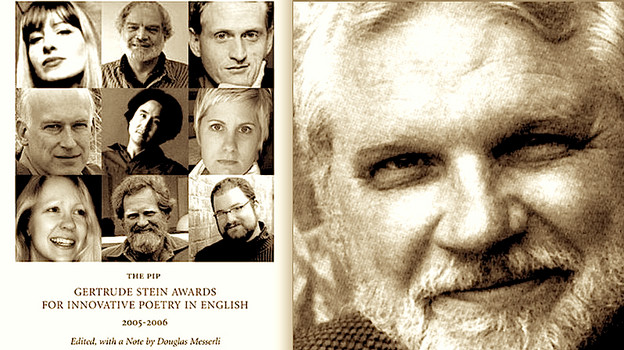
Douglas Messerli on The Gertrude Stein Awards in Innovative American Poetry
From Jacket #32 (April 2007)

The essay below will serve as the introduction to the Green Integer publication, due out in early 2007, of The PIP Gertrude Stein Awards in Innovative Poetry in English 2005-2006. I felt that readers of Jacket might be interested in this introduction because of my comments on the current reception by the larger newspapers, awards, and prizes concerning what might be described as innovative or — I think a far better term — exploratory poetic and poetics. Obviously, most of the writers of the kind of poetry with which I am concerned have long ago recognized the absence of discussion and acceptance of their poetry in the venues I describe; but I think it is important to reiterate the increasing hostility of the national media and other self-proclaimed arbiters of contemporary poetry to the wide range of poetic writing today—not only in the US, but throughout the world in English. To me it still remains utterly shocking—particularly because it has been so longstanding — that publications such as The New York Times Book Review, Los Angeles Times Book Review, the Times Literary Supplement, the National Book Award, the Pulitzer Prize, and National Book Critics Circle Award and numerous other places available for reviews and recognition of poetry remain so narrowly focused in their definitions of poetic expression.
* *
Douglas Messerli, ed. The Gertrude Stein Awards in Innovative American Poetry 1993-1994 (Los Angeles: Sun & Moon Press, 1995)
Douglas Messerli, ed. The Gertrude Stein Awards in Innovative American Poetry 1994-1995 (Los Angeles: Sun & Moon Press, 1996)
Douglas Messerli, ed. The PIP Gertrude Stein Awards in Innovative Poetry in English 2005–2006 (Los Angeles: Green Integer, 2007)
Writing in 1994 in the first Sun & Moon volume of The Gertrude Stein Awards in Innovative American Poetry, I noted that it had continually struck me “that at the end of a century primarily defined, in terms of literature, by its innovative poetry, the major literary awards, anthologies, and other publications devoted to American poetry still consist of the kind of academic and thematically-based poetry that Ezra Pound might have railed against in the first decade of the 20th century; poetry that Frank O’Hara, who at mid-century claimed a poem had to be at least as interesting as the movies, might today have been perceived as less interesting than the worst of television. In the commercial publishing world, the media, and the university, innovation is primarily frowned upon, if not out rightly dismissed.”
There was, obviously, no single solution to the situation I recognized that year, but I felt that at least by presenting an anthology of more innovative poetry, I might somewhat balance the equation and reveal what I perceived as a truer representation of the continuing tradition of late 20th and early 21st century American poetry and poetics. Predictably, such a gathering of writers resulted in some critical dismissal, one reviewer claiming he found little of interest in the work of the 94 poets included — such a broad-ranging disinterest that I can only surmise that he simply didn’t like poetry. The conservative press (which, in the context of their coverage of literature, includes The New York Times Book Review and Los Angeles Times Book Review) mostly ignored these anthologies, while attending to others such as David Lehman’s The Best American Poetry series (which I feel represents a more narrative-based poetry and works which the populist-conceived online encyclopedia Wikipedia has characterized as “Precious Moments Poetry”). For the writers of more innovative work and the less highly funded review publications, however, The Gertrude Stein Awards volumes offered a refreshing alternative. Unfortunately, after only two volumes, the series suffered as part of the more general financial difficulties facing my Sun & Moon Press, and I had to cease publishing.
In the ten years since the 1994-1995 volume, we have seen, with ever more increasing determination, what appears to be an almost concerted attempt to redefine the 20th century tradition of American poetic writing, one of the most obvious of these examples of literary revisionism being David Gates’s comment in The New York Times Book Review (in a basically negative review of Pound’s great poetic contribution) that “Compared with equivalent stretches of ground-clearing and throat-clearing by Frost and Yeats, little [of Pound’s poetry] remains readable. This is partly because, thanks to the modernist emphasis on subjective experience, poetry has largely come to mean their [Frost’s and Yeats’] sort of post-Romantic personal lyric.” Given the remarkably energizing output of poetry by established and younger authors that I noted in 1993, it is evident to me today that Gates must have read very few of those poets I had described as innovative writers.
[read more of this article]